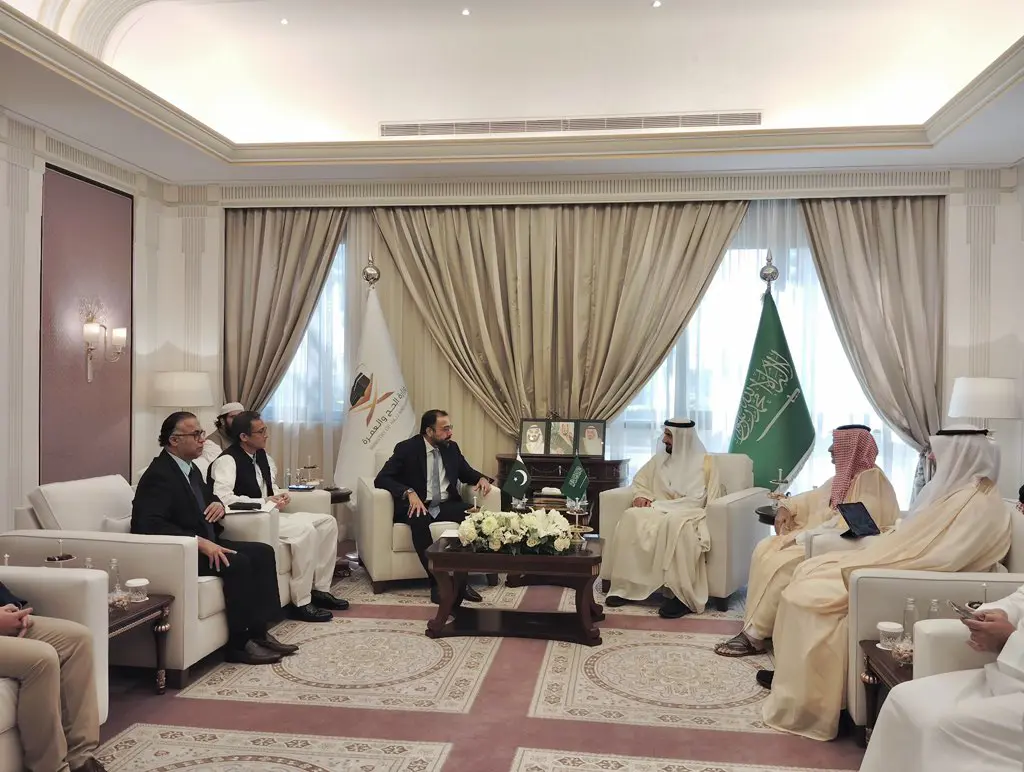
Islamabad, Pakistan – A significant Hajj Conference convened in Islamabad has issued a strong appeal to all intending pilgrims to meticulously adhere to the Saudi code of conduct established by the Ministry of Hajj and Umrah of Saudi Arabia. The conference, organized under the joint auspices of the Pakistan Ulema Council, International Tahzeem-e-Haramain Al-Sharifain Council, and the International Religious Tourism Council, underscored the critical importance of respecting the sanctity of the Two Holy Mosques during the Hajj pilgrimage.
Hajj Conference Highlights Importance of Saudi Code of Conduct for Pilgrims
The annual Hajj Conference, held on Monday at the Ramada Hotel in Islamabad, brought together prominent religious figures, diplomats, and Hajj organizers. Addressing the attendees, Federal Minister for Religious Affairs Sardar Muhammad Yousuf, alongside the Deputy Ambassador of Saudi Arabia to Pakistan, Al-Ustaaz Salah Al-Mutairi, and Chairman Pakistan Ulema Council Hafiz Muhammad Tahir Mahmood Ashrafi, collectively urged pilgrims to prioritize obtaining comprehensive information regarding the Hajj and Umrah procedures before their departure. This proactive approach, they emphasized, is crucial in mitigating potential challenges and ensuring a smooth and spiritually fulfilling pilgrimage experience.
Strict Adherence to Saudi Arabia's Rules and Regulations for Hajj Pilgrims
Speakers at the Hajj Conference consistently reiterated that the Kingdom of Saudi Arabia has consistently demonstrated its unwavering commitment to serving Islam and the global Muslim community, dedicating significant efforts to the welfare of the guests of Allah. In reciprocation, the conference stressed that it is incumbent upon all pilgrims to fully comply with the established Saudi code of conduct and the Kingdom’s laws throughout their Hajj and Umrah journey.
A key aspect of the Saudi code of conduct highlighted at the conference was the prohibition of any form of political gathering or activity during Hajj and Umrah period, particularly within the holy sites of Makkah, Madinah, Mina, and Arafat. Pilgrims were strongly advised to refrain from engaging in or being part of any such efforts, as the primary objective of these elements is to disrupt the peace and tranquility of the Two Holy Mosques and create difficulties for fellow pilgrims. Attendees were urged to distance themselves from individuals, groups, or parties promoting such agendas and to promptly inform their group leaders of any such occurrences, while also cautioning against the spread of rumors.
Essential Guidelines within the Saudi Code of Conduct for Hajj Pilgrims
The code of conduct disseminated at the Hajj Conference provided detailed guidelines for pilgrims, encompassing various aspects of the pilgrimage. Key directives are summarized in the table below for easier understanding:
| Guideline Category | Specific Instructions | Importance Level |
|---|---|---|
| Booking Integrity | Avoid unregistered groups, online platforms, and unpermitted individuals in Saudi Arabia. Hajj without a permit is not permissible. | High |
| Intention Purity | Undertake Hajj and Umrah solely for Allah's pleasure. Minimize videos and pictures of worship. | High |
| Information Acquisition | Obtain comprehensive knowledge before departure. Seek guidance from knowledgeable individuals during the journey if needed. Do not hesitate to ask for information. | High |
| Adherence to Organization | Follow the procedures and regulations set by the Ministry of Religious Affairs or Hajj group instructors, even if it contradicts personal preferences. | High |
| Ego Subjugation | Recognize the core objective of Hajj and Umrah as sacrificing ego and humbly presenting oneself before Allah. | High |
| Patience and Remembrance | Remember Allah, recite Talbiyah and Durood Shareef during potential delays. Understand difficulties are part of Hajj, and patience is rewarding. | Medium |
| Legal Compliance | Fully comply with the laws of the Saudi Ministry of Hajj and the Ministry of Interior in Makkah and Madinah to avoid chaos. | High |
| Avoid Political Activities | Do not create or participate in any political gatherings or activities in Saudi Arabia, especially at holy sites, as it disrupts peace. | High |
| Group Leader Instructions | Clearly understand and strictly follow the guidance of group leaders, especially during travel to Mina, Arafat, and Muzdalifah, to prevent accidents. | High |
| Rami-Jamarat Guidance | Adhere to instructions from scholars and group leaders regarding the stoning of Jamarat. Avoid hasty actions. | Medium |
| Utilizing Concessions | Women, the sick, and the weak should utilize the concessions provided by Islamic law for Rami-Jamarat and avoid creating unnecessary difficulties. | Medium |
| Prohibition of Illegal Acts | Strictly avoid begging and the possession or trafficking of drugs in the Kingdom of Saudi Arabia, as these are serious crimes. |
Resolution Acknowledges Saudi Arabia's Services and Appeals for Pakistani Pilgrims
A resolution was unanimously adopted at the conclusion of the Hajj Conference, wherein scholars and religious leaders from all schools of thought in Pakistan, along with leaders of political and religious parties and representatives of Hajj organizers, expressed their profound appreciation for the dedicated services rendered by the Kingdom of Saudi Arabia to Islam and Muslims worldwide.
The resolution acknowledged the commendable ongoing efforts of the Kingdom of Saudi Arabia in introducing improvements and facilities for the comfort and well-being of pilgrims. It unequivocally stated the commitment of all Pakistani pilgrims, organizers, and the government to fully implement the Hajj policy established by the Kingdom.
However, the resolution also highlighted the significant challenges faced by approximately 67,000 prospective Pakistani pilgrims this year due to a lack of understanding of the modern Hajj system and difficulties encountered in transferring funds from Pakistan to Saudi Arabia. Additionally, the resolution noted a misunderstanding among most Pakistani organizers regarding the February 14th deadline, for which the Pakistani representatives offered their apologies.
While expressing gratitude to the Kingdom of Saudi Arabia for the restoration of a quota of 10,000 additional pilgrims, the conference participants made an earnest appeal to the Custodian of the Two Holy Mosques King Salman bin Abdulaziz, Crown Prince Mohammed bin Salman, and the Minister of Hajj and Umrah of Saudi Arabia, Dr. Tawfiq Al-Rabiah, to extend special compassion and grant special permission for the remaining 67,000 Pakistani pilgrims to perform Hajj this year, acknowledging their severe anxiety and the exceptional circumstances.
The conference concluded with tributes to the Prime Minister of Pakistan, Mian Muhammad Shehbaz Sharif, Foreign Minister Senator Ishaq Dar, Federal Minister for Religious Affairs Sardar Muhammad Yousaf, and Chairman Pakistan Ulema Council Hafiz Muhammad Tahir Mahmood Ashrafi for their dedicated efforts concerning Hajj arrangements.
;More Travel News
-
 30-Sep-2022Top 10 Guaranteed Highly Paid Salary Countries Worldwide
30-Sep-2022Top 10 Guaranteed Highly Paid Salary Countries Worldwide -
 08-May-2019Choose the Perfect City According to Your Mood
08-May-2019Choose the Perfect City According to Your Mood -
 12-Jun-2023Japan's Cabinet Approves Long-Term Work Visas for Foreign Workers
12-Jun-2023Japan's Cabinet Approves Long-Term Work Visas for Foreign Workers -
 21-Jul-2020Explore The Beauty Of Khunjerab Pass And Have A Enthralling Travelling Experience
21-Jul-2020Explore The Beauty Of Khunjerab Pass And Have A Enthralling Travelling Experience -
 05-Jul-2023Embrace the Serenity of Sun Tourism - Exploring Warm and Sunny Mountain Areas
05-Jul-2023Embrace the Serenity of Sun Tourism - Exploring Warm and Sunny Mountain Areas -
 10-Mar-2021FBR Allows Tourists To Import Vehicles Without Duties For 6 Months
10-Mar-2021FBR Allows Tourists To Import Vehicles Without Duties For 6 Months -
 22-Feb-2021Kuwait Lifts Travel Restrictions From 35 Countries From February
22-Feb-2021Kuwait Lifts Travel Restrictions From 35 Countries From February -
 28-Oct-2019Umrah Dua
28-Oct-2019Umrah Dua
